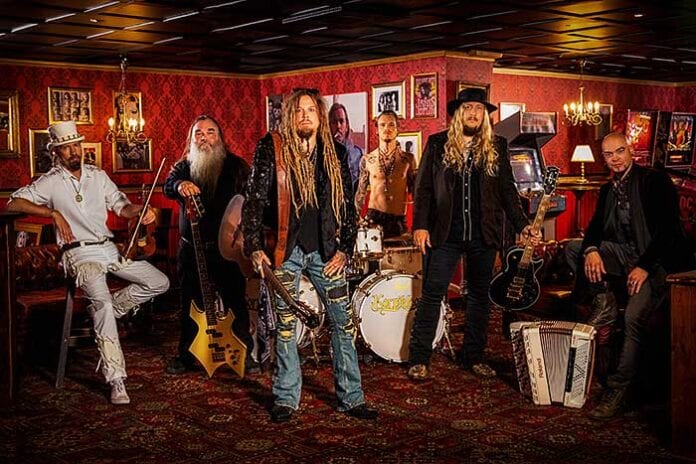
INTERVIEW WITH JARKKO AALTONEN BY KEVIN STEWART-PANKO
PHOTOGRAPHS BY PEERO LAKANEN
Jylhä is the title of the latest and 11th album by Finnish folk metal maestros Korpiklaani, and as a title, it’s as amorphous, multi-faceted, and fluid as the music found within. As the band continues to blaze their way along their side of the folk metal path they’ve been clear-cutting since 2003 (or 1993, if you take into account their previous life as Shaamani Duo and Shaman), the new record presents as the most diverse of their lengthy career as broad elements of proggy AOR, classic stadium rock, punk, metals of death, thrash, and black, and even reggae have been seamlessly weaved into the distorted two-stepping and waltz-y beer hall jigs the band has been draining from their musical keg for these many years.
As a means of promoting Jylhä during the era of no shows and tours, Korpiklaani has taken to the editing suite in order to lens videos for five of the album’s 13 tracks. We caught up with bassist Jarkko Aaltonen on a rare day off set and from in front of a camera to discuss how to consistently surprise oneself, the mystery of their new album’s title, and the curious world of Finnish pride.
You’ve been keeping busy during the pandemic not only by recording the new album but by filming a lot of videos.
Well, of course, everything got cancelled. You plan your life and income based on a certain number of tours coming up and suddenly there’s nothing. At first, the free time was quite nice, but soon after realizing this wasn’t going to end any time soon, it started to become an annoyance. Then, it was a shitty situation in many ways. In the beginning, it was okay because we had planned to record the album in March, April, and May anyway. We ended up having an endless amount of time, so we did a proper pre-production and were definitely the most prepared we had ever been when we finally entered the studio. In that sense, for the album, it was good thing, but the rest of it has been sort of crappy. The number of videos we have done—we’ve released four and the day before yesterday we filmed one more and that will be the last one—has been quite a bit for one album. It’s been quite expensive, but the way we thought about it is that no one has seen us anywhere in the past year, so we decided to make ourselves visible in this way.
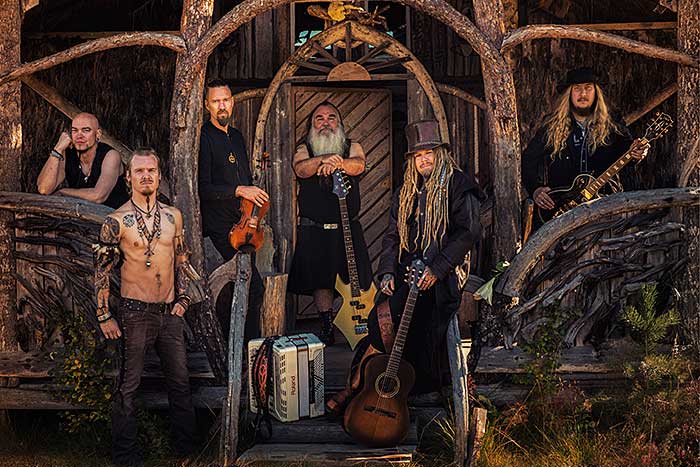
How many videos were you originally planning? I can’t imagine you were planning to do five.
No, no. I don’t think we’ve ever done more than two per album, three at the maximum. We’ve done some lyric videos or whatever, but never anything like this.
“IT’S BEEN A BIT DIFFERENT HERE. UNTIL THE LAST COUPLE OF MONTHS, WE’VE HAD A GOOD SITUATION”
How extensive or strict are the social gathering restrictions in your area? Was it challenging to work around things in order to shoot the videos?
Currently, the limit on social gatherings here is 10 people. So, with the band and a tiny video crew we can still film a video, but there was a time last year when at the end of the summer where things weren’t too bad here and we actually had some indoor festivals with a few hundred people. I’ve read about my friends in North America complaining about their lockdowns and them sitting inside the house for almost a year, but it’s been a bit different here. Until the last couple of months, we’ve had a good situation—the bars have been open and all that kind of stuff. They have to close early with the idea being that if you have a bar open until two or three AM, people will get extremely drunk and will not care about personal space. So, they have to close at 10PM, but this only means that people are getting drunk earlier (laughs).
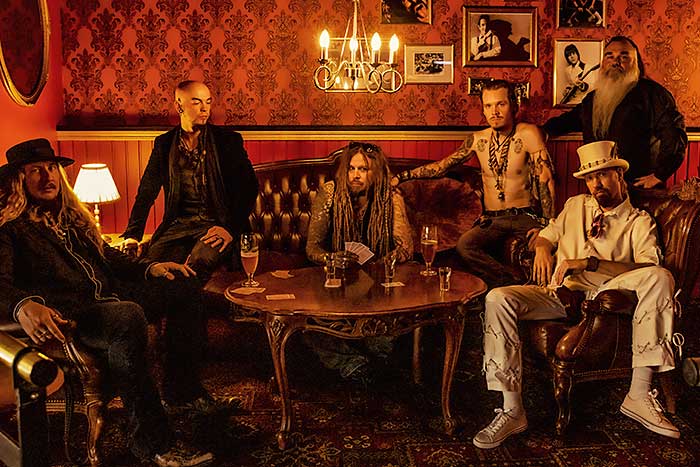
How much of Jylhä was completed before the world went to shit?
The music was written way before this, but I can’t remember exactly when. This all started in March, and it didn’t really make too much of a difference to the album except that we were originally booked into a different studio. The one we were supposed to use decided to close entirely for the virus, so we ended up going to a different studio but using the same producer.
“ALL THIS EXPANDING THE STYLE AND ALL THAT IS MORE OF A NATURAL DEVELOPMENT.”
This new album is probably the most diverse of your discography. Was that a deliberate move during the writing process?
No. When it comes to writing the albums, we have never really thought about it like that. For us, an album is a collection of the songs we have at the moment, so the end result is what it is, a compilation. There are, of course, some times when I think about picking up a guitar and writing a song using a particular tempo or in a certain style or whatnot, but all this expanding the style and all that is more of a natural development. But you’re right, it is a more diverse album.
If that’s the case, are you ever surprised when you hear the final result?
Quite often, actually. I don’t know if it’s the same with the other band members, but I think they also have the same thing happen when we have the demos compared to the album. Even though our demos are quite complete, they’re still missing a lot of stuff, and once you put the songs in a certain order, rehearse them, and get the final product, it’s like, “Oh, this turned out quite different.” Very often, the song that you think is going to be the opening track on the album or the album’s best song or the first single, in the end you realize it’s not exactly like that. There are times when a song that we first thought would open the album has ended up as the second song on the B-side once we’re finished with it.
“THE BAND HAS TURNED FROM BEING AMATEURS TO PROFESSIONALS. THIS HAD TO HAPPEN IN ORDER TO BE DOING THIS FOR AS LONG AS WE HAVE.”
Having been in the band for as long as you have, but not being an original member [Jarkko joined after Korpiklaani’s second album], what differences do you hear between then and now?
The band has turned from being amateurs to professionals. This had to happen in order to be doing this for as long as we have. It was bound to happen, unless you’re an idiot (laughs). There’s a huge change in everything that we do, even if we are still the same idiots. It is completely different, everything is more professional, the scheduling of what to do and when to do it is so much more planned out. Everything is more focused on what we have to do and that is the biggest change. A while ago—on the last tour, actually—we added some songs from those first two albums into the set that we hadn’t played in a very long time. I had to listen back to those first two albums at the time as a refresher and I was surprised that they were way better than I remembered. I thought there was not much stuff from those records that we could do nowadays, but surprisingly, there was. It was different, but still good.
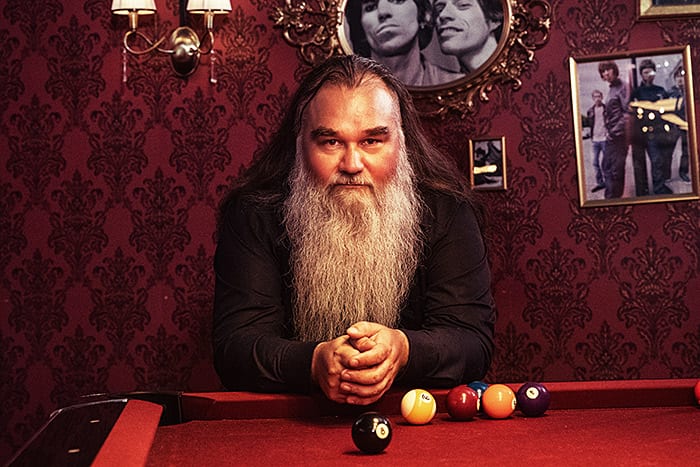
Alestorm recently told me that they use samples and keyboards to record their accordion parts because the instrument is difficult to keep in tune and wheezy. Is that a problem you also encounter?
The accordion that we use nowadays and have been using for many years now is actually a digital accordion. It sounds exactly like a real accordion, but it doesn’t have those problems. In the old days, when everything was a bit more amateur-like, we had a standard accordion with a microphone setup inside it and it was still picking up everything on the stage. The violin had the same problem and, yeah, that is a problem with the, shall we say, real instruments.
To keep it all from collapsing when you play live, do you work with specialists that have a particular skill in dealing with combining traditional instruments with the electric ones?
I guess (laughs). It’s quite clear that the front of house guy has to have some idea of what we’re supposed to sound like. We’re still a rock ‘n’ roll band with loud guitar, bass, drums, and vocals, but then we have those other instruments, and in the whole wall of sound there has to be space and room for those two. We have worked with the same front of house guy for 10 years, maybe more.
How long did it take to perfect your live sound? Were there a lot of hurdles and growing pains?
I don’t know. We’re on stage hearing something different through the monitor mix. Maybe we still sound like shit out there (laughs)! The guy who does our front of house mixing, we knew him before and he knew what he was signing up for. It’s fine because what he does and what the crew does, I don’t really get into or understand that much. I don’t even really want to know.
“WE DIDN’T REALIZE UNTIL IT WAS TOO LATE THAT THERE’S NO PROPER, ONE-WORD TRANSLATION FOR IT IN ENGLISH”
You bio says something about Jylhä having a meaning but not exactly having a meaning. What’s going on with that?
It definitely has meaning for a Finnish speaking person. They’ll know exactly what it means and what it’s about, but we didn’t realize until it was too late that there’s no proper, one-word translation for it in English, which is, of course, the reason everyone will ask that question: what does it mean?
And I’m going to ask that question.
(laughs) It is a word that is mostly used to describe a certain kind of landscape or scenery, but then again it can also be used to describe music, for example. The closest that we got to a proper translation is “majestic,” but it still means something more than that.
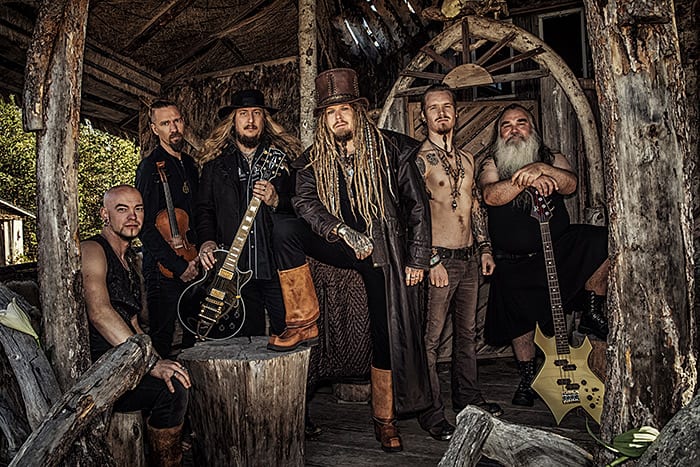
Does it apply to what the songs are about, overall?
I don’t think it’s so much about the lyrics as it is a reference to the music and the style. There are some musical capacities that relate to that theme.
Unlike most Finnish bands, you’ve taken the reverse path of starting with singing in English to now using your native tongue almost exclusively. With that in mind, is your popularity and how well you’ve been able to connect with fans around the world surprising?
Of course it is, especially when we started touring outside of Finland for the first time. We didn’t even know that we had any kind of following outside of Finland, or even inside of Finland for that matter. Then, we’d go and play in Germany or some place and suddenly realize there are people who are into the band that have started to study Finnish because of our music. Sometimes, the people are into Finnish folklore and stuff more than we are, and they’ll talk about planning to come and study in Finland and all this sort of thing. It definitely was a surprise to see that a rock band can have that sort of life changing effect on some people. Anyway, the whole thing is that we are singing about our folklore and culture, but at the same time we are telling and encouraging people to go and study their own history and their own people’s past. I think that is important for people nowadays because the world is getting smaller and smaller and no one is “supposed to be.” You’re not supposed to be Polish or Italian or Finnish. You’re supposed to be European and no one wants that. People want the colors, not just the plain grey.
Are you considered Finnish ambassadors at home?
(laughs) I have no idea and have never thought of it that way, but I think that is actually what happens when someone other than the music press writes a story about us. Having local newspapers write about us is quite a common thing, and when they do they focus not so much on the music, but on the cultural side and meaning of the band.
Do you find that the everyday, average Finnish person is proud of what you do and what you’ve accomplished?
I actually don’t know. I don’t think being proud of what someone else has done is the way many Finns think. Finns can be happy for what someone else has accomplished, but they are not proud. They’re not even proud of the things they’ve done themselves (laughs). To make a scene out of yourself is just not the Finnish way of doing things. There is a difference in attitudes in the sense that gaining success and people starting to talk shit about you because of that success doesn’t really happen in Finland that much. When you tour with other Finnish bands or meet up with someone Finnish at a festival or something, no one is putting anyone else down and everyone is very supportive. Everyone is happy that somebody has managed to do something. I’ve heard there’s a lot of stuff like that happening in the USA, for example, where it seems like it’s not enough to make yourself look good, you also have to make others look bad. It is quite different here in the sense that no one tries to sabotage anyone else in any way.




















